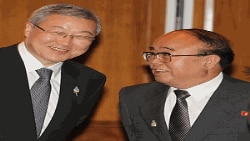International diplomacy appears to be paving the way for Pyongyang to return to the negotiating table. In Seoul, officials are taking a cautious approach following discussions with the North Koreans last Friday at a regional forum in Indonesia.
First inter-Korean meeting in 31 months
South Korean Foreign Minister Kim Sung-hwan is dampening optimism about any significant breakthrough that may follow the first non-secret inter-Korean meeting at the government level in 31 months.
Speaking Monday on a radio program (on YTN News FM) in Seoul, Kim says the North-South diplomatic encounter on the sidelines of the ASEAN forum in Indonesia should not raise expectations of immediate progress in relations.
He says the Bali talks last Friday do, however, play a “catalytic” role for inter-Korean relations.
Immediately after that surprise meeting, U.S. Secretary of State Hillary Clinton announced that North Korea’s vice foreign minister, Kim Kye-gwan, has been invited to New York.
Aiming towards six-party talks
Kim Yong-hyun, a specialist in North Korean affairs at Dongguk University in Seoul, says the diplomacy in Bali appears to be setting the stage for a resumption of nuclear disarmament talks that collapsed in 2008.
Kim says the discussions in Bali were a step toward getting the six-party talks back on track. Another analyst, however, sees this as a reverse step. Balbina Hwang is a regional security specialist who is a visiting professor at both Georgetown University and the National Defense University in Washington.
“Clearly they are falling back on the previous model that was set up and never completed. I don't see any reason why they have to fall back to that model," Hwang stated. "But I think it goes to show that there is a sort of a lack of creativity, but beyond that, a lack of really initiative or any kind of leadership in either Seoul or Washington to make any real breakthrough with North Korea.”
Besides the two Koreas and the United States, the six-party talks also included China, Russia and Japan.
Apology as a pre-requisite
Since the collapse of the last round, North Korea conducted a second nuclear weapons test and unveiled what it said was a uranium enrichment facility that could give it another method to produce atomic bombs.
Hwang says even if there is a resumption of the six-way negotiations, there is little likelihood they will result in anything significant.
“Everybody is treating this as if 'wow, we have a major breakthrough if everybody can get together and the six-party talks resume.' There's absolutely no indication that Pyongyang is willing to give up anything. There's also no indication to me that Washington and Seoul are willing to relent on any of their firm positions either. If talks restart they restart. But to me that's not particularly important," Hwang said.
In a Monday editorial, South Korea’s Joong Ang Daily newspaper argued that despite the failure of the previous talks, there is no other international forum that could “peacefully convince North Korea to dismantle its weapons programs.”
Since the six-way talks broke down, tension between the two Koreas has increased. Seoul and others blame Pyongyang for the sinking of a South Korean warship in the Yellow Sea in 2010. North Korea also launched an artillery attack on a South Korean island in the same waters last year.
Seoul has repeatedly stated that an apology for the provocations is a pre-requisite to any improvement in cross-border ties.
South Korea’s foreign minister said Monday the government remains firm that North Korea must take what he called responsible steps in the wake of the actions last year, which resulted in the deaths of 50 South Koreans. But officials say the lack of an apology from the North -- which they concede is unlikely to be forthcoming -- is not going to block the South's consent to revived international diplomacy with so much at stake.
The two Koreas technically remain in a state of war since their devastating three year civil conflict of the early 1950’s ended with a truce, not a peace treaty.




